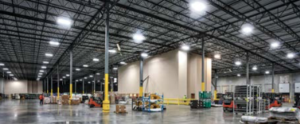Craig Roeder has been at the forefront of a technological revolution in the logistics industry.
As the global marketplace rapidly changes, Craig Roeder and ProTrans lead the technological revolution.
When Craig Roeder founded ProTrans International, Inc., one of the fastest-growing logistics companies in the U.S., in 1993, the logistics industry as we know it today was still in its infancy.


The industry underwent further transformation in the 1990s with the introduction of Enterprise Resource Planning (ERP) systems, which significantly improved data availability and ac- curacy. “For us, it was about seizing that opportunity,” said Roeder, who remains CEO of the company today.
ProTrans is a full-spectrum logistics management enterprise headquartered in Indianapolis, Indiana, which offers Third-Party Logistics (3PL) Services, including logistics design, carrier procurement, and supply chain and transportation management, along with other supply chain solutions for today’s increasingly interconnected marketplace.
The founding of ProTrans coincided with the implementation of the North American Free Trade Agreement (NAFTA), in 1994, which famously integrated the economies of the U.S., Canada, and Mexico, and the company continues to move with the times, notably in the area of technology.
“The decision we made early on was to focus on inbound operations that lent themselves to the rapidly growing manufacturing sector in Mexico,” said Roeder, describing the evolution of the company over the past two decades. “In 1996, we began writing our own software.
In 2005, we made the decision to expand into logistics management and be- come a 3PL provider, and in 2010, we made the decision to write our own web-based Transport Management System (TMS) software.
“It was a strategic decision because it gives us the adaptability to meet customers’ changing demands. We own the source code and have tremendous flexibility to create unique solutions for each individual customer,” he explained.
The results have been impressive. ProTrans currently operates over 25 service centers throughout Canada, Mexico, and the U.S. The company recently expanded its presence in Greer, South Carolina, by opening a state-of-the-art, 230,00-square-foot, cross-dock and transportation facility near BMW Manufacturing, the second largest production facility in the world.
The ProTrans Greer facility, which has already won a string of industry awards, also has immediate access to the South Carolina Inland Port (SCIP) in Greer.
Furthermore, ProTrans was recently selected among the Top 100 Third-Party Logistic Providers by Inbound Logistics magazine for the fifth year in a row, and received the Supplier Passion for Performance Award from Cooper Standard Automotive, among other industry awards.
Given the success and industry recognition, Roeder has no doubt when it comes to the company’s future potential. “We want to compete as a Fortune 500 level company,” he said. “Over the years, we’ve run into opportunities where we may have had the best solution for North America, but the lack of a global footprint was detrimental to us. So, right now, we’re focusing on establishing that global footprint.”
A changing industry
As the global marketplace rapidly changes, technology is naturally playing an increasingly important role in the logistics industry. Roeder is particularly proud of a new software that has enabled ProTrans to capitalize on its market share and increase the company’s capabilities in operational excellence. “It’s hard to be in the logistics field today and not be technology-driven,” he explained.
“To that end, we just wrote a software program called Optimiz, which will replace ProTrack, which ran the [shared freight} consolidation side of our business for twenty years.”
A key advantage of this latest upgrade is the development of a world-class mobile-scanning solution that enables the visibility of in-transit shipments with active status and detailed mapping functionality.
“Going forward, we’re continuing with the design phase of our software and writing mobile apps,” said Roeder. “We want to anticipate what the user would like to see, and be able to provide them with the information they need.”
Roeder believes that ProTrans’s extensive use of technology and constant innovation is precisely what differentiates the company from competitors. “The advantage of technology is that it provides both our customers and ourselves with the actionable data visualization to make strategic business decisions,” he said.
Innovation in supply chains


According to Roeder, ProTrans takes a uniquely hands-on approach to procurement through re- gionally based managers that work in the eld, sitting down with transportation carriers no matter where they are located. “If the carrier’s operating out of their kitchen, we want to go to their kitchen and have a cup of coffee with them,” he said. “There are thousands of transportation providers out there, but from our point of view, you have to seek them out and build a relationship with them.”
ProTrans currently has over 3,000 carriers avail- able to meet the diverse business needs of their customers. “Looking at the carrier side of the business, the advantage that ProTrans brings to those providers is a large customer base,” Roeder explained.
“We manage hundreds of thousands of truckloads per year, and so our ability to match that carrier’s lane density to loads from customers is huge. We also give carriers the opportunity to become more tech-savvy in their updates with our customers, so they get a side bene t from using our platform.””
The increasing interconnectedness of the North American and global economies along with the growing need to enhance efficiency through technology are key to Roeder’s vision for the future.
“The most important things for us are the expertise we have within the manufacturing sector of the economy, and our ability to share resources,” he said. “However, our ability to write code to address our customers’ unique challenges is the real key to our success.”












